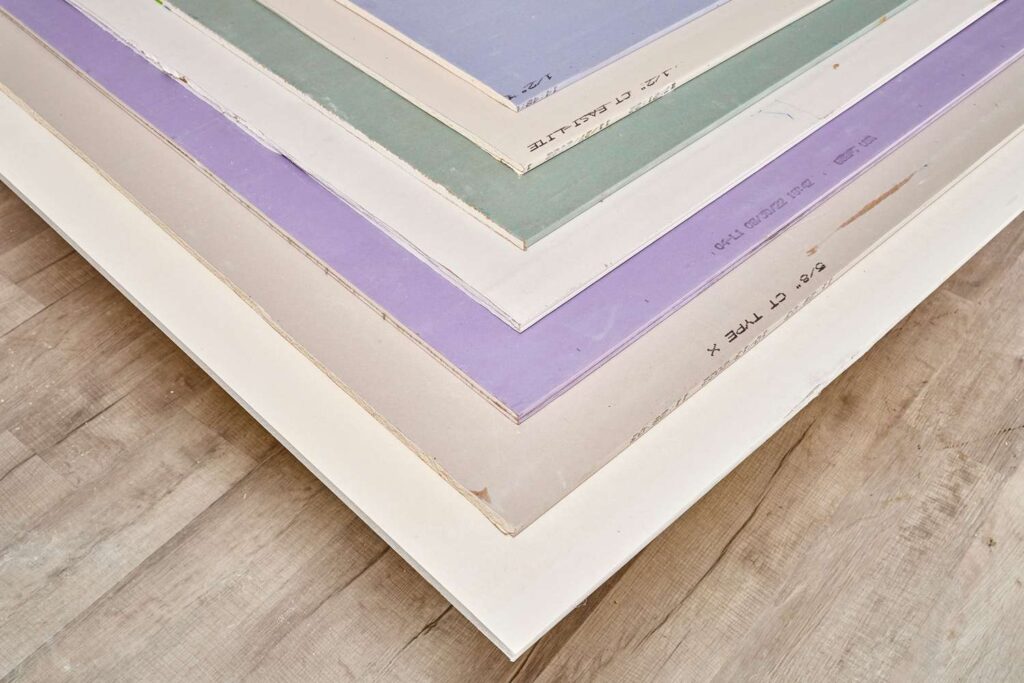
What Are the Different Types of Drywall?
Drywall, also known as plasterboard or gypsum board, is a versatile and essential material used in the construction of walls, ceilings, and partitions. It comes in a variety of types, each designed for specific applications. Whether you are working on a residential, commercial, or industrial project, understanding the different types of drywall available can help you choose the right product for your needs. In this article, we’ll explore the various types of drywall, their uses, and the benefits of each.
Standard Drywall (Regular Drywall)
Standard drywall is the most common type used in residential and commercial construction. It consists of a gypsum core that is sandwiched between two layers of paper. This type of drywall is used primarily for creating walls and ceilings in areas that do not require specialized characteristics such as fire resistance or moisture protection.
Benefits:
- Cost-effective
- Easy to install
- Suitable for most indoor applications
Common Uses:
- Living rooms
- Bedrooms
- Hallways
Fire-Resistant Drywall (Type X Drywall)
Fire-resistant drywall, also known as Type X drywall, is specifically designed to prevent the spread of fire. It contains additives such as glass fibers, which help to slow the transfer of heat. Type X drywall is commonly used in areas where fire safety is a concern, such as kitchens, utility rooms, and garages. It is often required in commercial buildings and multi-story constructions to comply with building codes.
Benefits:
- Provides enhanced fire protection
- Meets building code requirements for fire safety
- Reduces the risk of fire spread
Common Uses:
- Commercial buildings
- Kitchens
- Utility rooms
- Multi-family residential buildings
Moisture-Resistant Drywall (Greenboard)
Moisture-resistant drywall, also known as greenboard, is designed to resist moisture and humidity. The gypsum core is treated with special additives, and the paper facing is coated with a moisture-resistant material. Greenboard is commonly used in areas prone to dampness, such as bathrooms, kitchens, and basements. However, it is not completely waterproof, so it is best used in areas with mild to moderate moisture exposure.
Benefits:
- Resists mold and mildew growth
- Ideal for areas with high humidity
- Provides additional protection against moisture damage
Common Uses:
- Bathrooms
- Kitchens
- Basements
- Laundry rooms
Moisture and Mold-Resistant Drywall (Purple Board)
Moisture and mold-resistant drywall, often referred to as purple board, is an upgraded version of greenboard. It is designed to provide superior resistance to both moisture and mold. The gypsum core is treated with a special formula to prevent mold growth, and the paper facing is coated with a water-resistant material. This type of drywall is ideal for high-moisture areas such as bathrooms, kitchens, and basements, especially in regions with high humidity levels.
Benefits:
- Offers enhanced protection against mold and mildew
- Ideal for wet or damp environments
- Durable and long-lasting
Common Uses:
- Showers
- Bathrooms
- Basements
- Kitchens
Soundproof Drywall (Acoustic Drywall)
Soundproof drywall, also known as acoustic drywall, is designed to reduce sound transmission between rooms. It contains a denser core and additional layers to block sound. This type of drywall is ideal for areas where noise reduction is important, such as home theaters, offices, and apartments with shared walls. Acoustic drywall can significantly improve the acoustic quality of a room by reducing noise from external sources.
Benefits:
- Reduces sound transmission
- Improves room acoustics
- Ideal for noise-sensitive areas
Common Uses:
- Home theaters
- Office buildings
- Apartments and condominiums
Impact-Resistant Drywall
Impact-resistant drywall is designed to withstand physical damage from impacts and abrasion. It is made with a reinforced core and a thicker paper facing, making it more durable than standard drywall. This type of drywall is often used in high-traffic areas or places where walls may be subject to damage, such as hallways, schools, hospitals, and gyms.
Benefits:
- Highly durable and resistant to impacts
- Ideal for high-traffic areas
- Helps prevent dents and scratches
Common Uses:
- Hallways
- Schools
- Hospitals
- Gymnasiums
Paperless Drywall
Paperless drywall eliminates the traditional paper facing found on standard drywall. Instead, it uses fiberglass mesh or a fiberglass-based facing. This makes the drywall resistant to mold and mildew growth, as well as more durable and moisture-resistant than regular drywall. Paperless drywall is often used in areas that are highly prone to moisture, such as bathrooms, basements, and kitchens.
Benefits:
- Resistant to mold and mildew
- More durable than traditional drywall
- Ideal for high-moisture environments
Common Uses:
- Bathrooms
- Basements
- Kitchens
Cement Board Drywall (Backer Board)
Cement board drywall is used primarily as a backing material for tiles in wet areas like bathrooms, kitchens, and showers. It consists of a cement-based core that is resistant to water and mold. Cement board is highly durable and provides a strong substrate for tile installations, ensuring that the tiles remain firmly in place without the risk of damage from moisture.
Benefits:
- Provides a strong base for tile installation
- Resistant to water and mold
- Durable and long-lasting
Common Uses:
- Bathrooms
- Showers
- Kitchen backsplashes
Conclusion
As you can see, there are many types of drywall, each designed for specific uses and environments. From standard drywall for general applications to fire-resistant, moisture-resistant, and soundproof options, there is a drywall type to suit every project’s needs. Choosing the right drywall for your construction or renovation project ensures that your walls and ceilings perform as expected and stand the test of time.
Call to Action
Looking to find the best drywall for your project? Whether you need fire-resistant, moisture-resistant, or soundproof drywall, we have a wide range of options to meet your needs. Contact us today to discuss your project and get expert recommendations on the best drywall solutions!